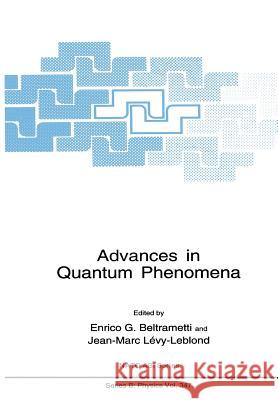Advances in Quantum Phenomena » książka
Advances in Quantum Phenomena
ISBN-13: 9781461358138 / Angielski / Miękka / 2012 / 377 str.
2 EnricoBeltrametti 1andJean-MarcLevy-Leblond 1Dipartimentodi Fisica, Universitadi Genova ViaDodecaneso33,1-16146 Genova, Italy 2physiqueTheorique, Universitede NiceSophia-Antipolis Pare Valrose, F-06108 Nice Cedex, France As customary, the idea of this meeting was born out during another one. The present authors were attending some colloquium among the numerous meetings devoted to the endless discussion of the foundational problems of quantum theory, when it struck their minds that physics, after all, was also an experimental science. Maybe, they thought to themselves, our very understanding ofquantum concepts would gain from more thoroughly taking into account the impressive accumulation of modern experimental results on the fundamental aspectsofquantum behaviour. Experiments once deemed as 'gedankenexperiments' now become routinely feasible, and far-ranging progresses in the practical mastering of quantum phenomena have been accomplished in the recent years. The variety of domains where quantum phenomena are currently investigated is extending beyond expectations, while their essential unity is ever more obvious. As no physicist can seriously believe that "quantum" is the last word about Nature, thedrive tocheck thelimitsofvalidityofquantum ideas is a powerful motive behind the everincreasing precisionofitsexperimental tests. Butno experimental fact up to now has surfacedwhich seems tochallenge the main concepts of quantum theory. The robustness and reliabilityofquantum theory is all the moresurprising whenoneconsiders theextensionof its rangeofvalidityduring the nearcenturyofitsexistence - from the atomic scale down to the subnuclear one ("particle" physics), and up to the astronomical one (white dwarfs, neutron stars, etc. ).











